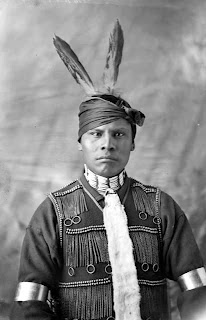 |
| Brave Bear |
Brave Bear was arrested and tried for the offense, at Fargo, in 1878. The evidence was sufficient to convict him, but the question of the jurisdiction of the court being raised, the judge held that as Pembina was an organized county, the accused should be tried by the District Court of that county. He was then transferred to Pembina County, confined in jail, broke jail, and with his Indian wife made his way to Fort Sully in 1879, where he was accused of murdering a young white man, Joseph Johnson, and robbing him of a sum of money and a horse. He then feld north and joined Sitting Bull in British America. He surrendered with the hostiles in the spring of 1881, and returned to near Fort Sully, where he was discovered and arrested for the Johnson murder.
He was taken to Bismarck and had an examination before the United Stated commissioner, who found sufficient evidence of guilt, and held him for trial before the United States District Court at Yankton, in November, 1881. He made an effort to commit suicide by poison while in the Yankton jail, but recovered. He was indicted for the murder of young Johnson, a discharged soldier, tried and convicted at the November term of court, but the trial was not reached until late in the term. Judge Edgerton had succeeded Jodge Shannon as judge of the district.
The trial jury was composed of R.B. Finlay, Clay County; Erick Haralson, Lincoln County; William Allison, Brookings County; George Ford, Sr., Union County; Willis R. Stone, Brookings County; Isaac N. Esmay, Yankton County; Patterson F. McClure, Hughes County; Edwin F. Devol, Deuel County; Andrew A. Quamberry, Clay County; Albert P Hull, Deuel County; Ira Ellis, Union County; Duncan Ross, Union County.
But one day, January 4, 1882, was consumed in the trial. The principal witness was Edward Allison, a Government scout under General Terry. Brave Bear was found guilty of murder and sentenced to be hung. His own admissions, frequently made to Allison and others, convicted him. Oliver Shannon, Esq., of Yankton, defended him, but he had no testimony to offer. The jury was out one hour. H.J. Campbell, United States attorney, conducted the prosecution. He was hung on November 23, 1882.
From HISTORY OF DAKOTA TERRITORY by George Washington Kingsbury
1 - "In any event they attained distinction in the field of high crime, when they found it to their purpose to commit a frightful butchery while engaged in robbing a settler named DeLorme, near Pembina, North Dakota, in 1873. They had entered a stable for the purpose of stealing horses, and when two of the owners arrived on the scene, they shot and killed both, and a third man was mortally wounded. In the house were two women, and the Indians attacked them, shooting and wounding both of them. One of the women put up her hands to defend herself from a blow aimed at her head by Brave Bear, who carried a sword, and who struck her with it. The blow cut off one of her fingers, laid open her scalp, and stretched her apparently dead; but she recovered, as did the other woman. Brave Bear and The Only One rifled the place, stole several horses, and escaped to the Missouri River country..."
- From book, "My friend, the Indian", by Standing Rock Agent James McLaughlin
In the article, it says Delong Family killed. It is suppose to say the Delorme Family.
ReplyDelete